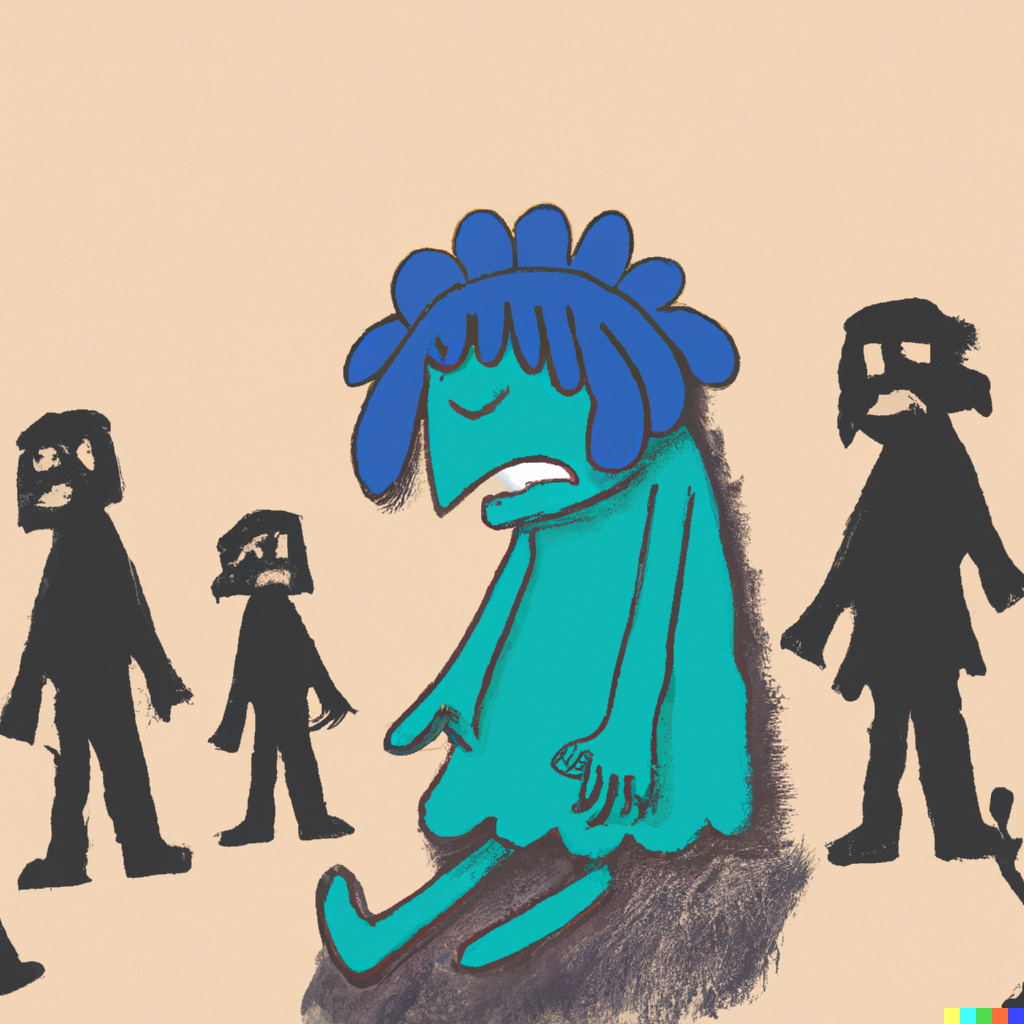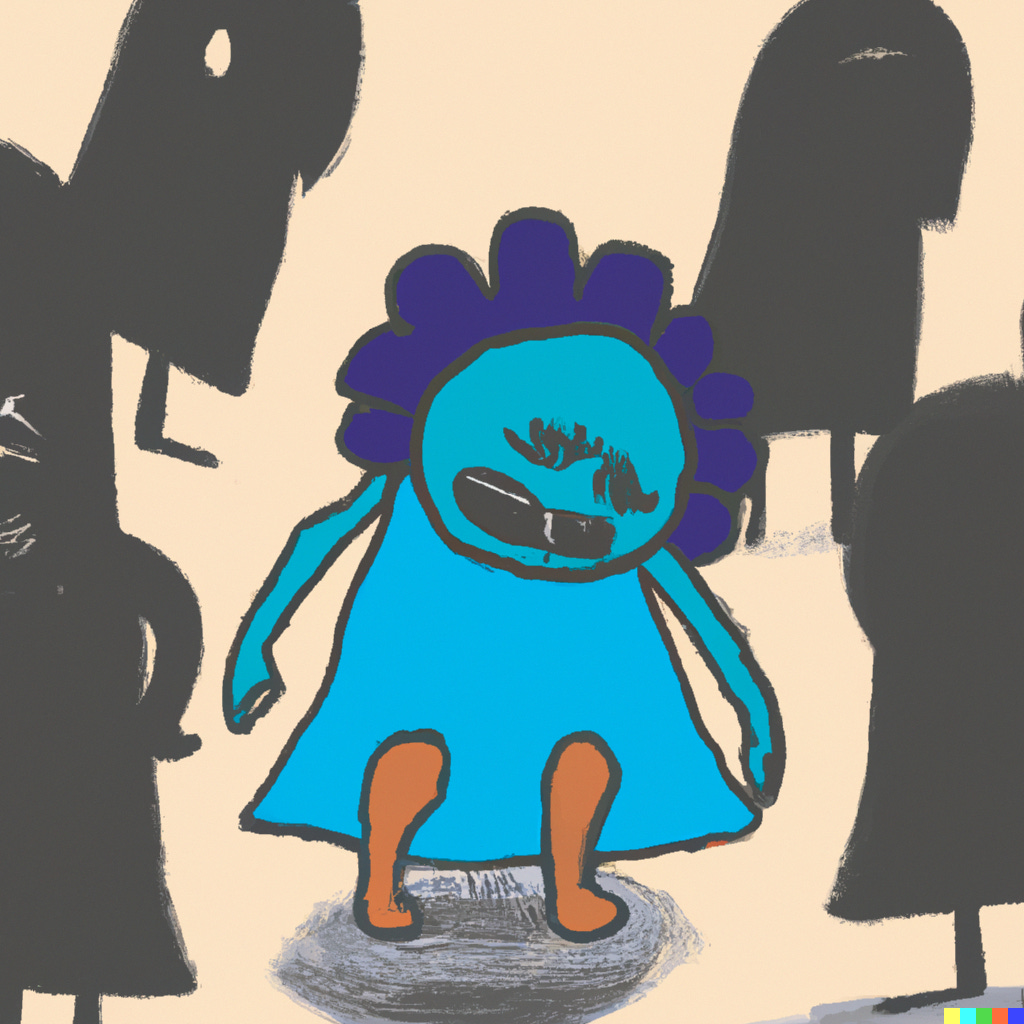#6 Imposter Syndrome and confronting the cages we build for ourselves
Calling out thoughts in our head to free ourselves from them
Skip this depressing story of isolation and self-depreciation and get to the takeaways.
This is part 1 of 4 of the Imposter Syndrome Series
Part 2 - Being able to identify what you like to do and how you succeed is a strength, not a weakness.
Part 3 - You feed your imposter syndrome monster when you over-attribute your success to luck.
The Imposter Syndrome Series
The next 4 issues are going to focus on Imposter Syndrome. Many of us, neurotypical or not, feel it at some point in our lives. For some, it’s a feeling that nags but never interferes. For others, especially those with ADHD, that feeling of fear and being outed as a fraud, is something we wrestle with regularly. We may not feel it every day but in times of hardship, transition, or promotion, it can overwhelm our thinking. Its sensation is amplified by the ADHD traits of self-criticism, low self-esteem, and rumination. The imposter distorts both our positive and negative experiences. It can feed off our successes. Warping what should be joy and accomplishment into fear and anxiety. Failures, large or small, add disproportionate weight to the insecurity and fear we carry. Sounds fun right?
I don’t have the ultimate solution for this. I struggle with it, even more so now as I search for a new job. I swing between the extremes of feeling confident and terrified in the interviews I go through. So what’s a product manager to do? Look deep into their soul, acknowledge their fears, try to figure out a solution, and share it with strangers via a bullet point list.
The 4-point guide to confronting the imposter
Being able to identify what you like to do and how you succeed is a strength, not a weakness.
You feed your imposter syndrome monster when you over-attribute your success to luck.
There are nearly limitless types of PM roles and cultures out there, and the likelihood that there isn’t a company that doesn’t need your skill set is very small.
Let’s jump into this week’s story:
You can free yourself from the isolation (professionally or emotionally) that the imposter imposes on you by creating meaningful connections with others.
Introduction and monsters
Imposter syndrome is something I’ve struggled with throughout my 8+ careers thus far. Imposter syndrome is the fear that others will find our recognized abilities or title are higher than our actual abilities. No matter what field I’ve been in, I’ve felt the fear I might get to a place a little beyond my abilities and be outed as a fraud. The Peter principle states that this is likely inviability. I have a fear of being pushed a little too far, failing, and leaving (the job or any idea really) in shame, again. I have told people in the past a mean joke about myself, “I look really good on paper, until they meet me”. Meaning, while I recognize I have many accomplishments, the reality of who I am does not live up to that list. I will disappoint them and I’ll hang my head in shame. It’s not an if, it’s a when. The imposter is a monster that sits inside me, waiting patiently to consume me.
My very scientific formula for ADHD imposter syndrome:
Imposter syndrome x ADHD anxiety + shame wizard + guilt = Imposter guilt mega-monster
Isolation and the prison of our own making
Now that I’ve anthropomorphized my newly made monster, let’s talk about how it can impact our lives. ADHD can amplify the negative feelings and thoughts of imposter syndrome. Our hyperactive brain kicks all those naturally occurring imposter thoughts into levels our neurotypical friends can’t imagine. All that self-doubt and fear can become isolating emotionally and professionally. Emotionally you can begin to question if what you feel, is really what you should be feeling. “I’m probably overreacting” or “My friends wouldn’t feel this hurt”. It becomes an exercise of emotional justification which can lead to more shame. You should allow yourself to listen to what your body is saying, and to feel what you feel.
Professionally, it’s common to experience isolation when we’re the only PM on a team, work in an immature product org (or just a messed up one), or don’t have other PMs that can provide the support you need. Without peers for support or a way to calibrate your performance, you’re left alone to figure out questions such as:
“How do I know I’m doing PM stuff the right way?”
“Am I performing at the level I should be?”
“What do I do if I get stuck?”
“Have the needs of my team/company exceeded my abilities?”
“How will this all burn in flames?”
That isolation enables the worst parts of our ADHD imposter syndrome to run free in our minds. It can especially make it overwhelming to complete projects that raise our status or visibility, such as completing a degree or being promoted. Our successes can feel like an invisible hand pushing us a little closer to our inevitable downfall. We may think “If I become an (insert level) product manager, people are gonna find out that I’m really a phony. Maybe I should stay at the level I’m at”. We procrastinate or avoid the projects we want or should do, much to our professional and personal detriment. I have first-hand experience with this. We become our own saboteurs and accomplices to our imposter monster. Bringing to fruition the shitty fate we wrote in our heads for ourselves.
Comparing yourself to self-imagined peers
The environment of isolation and the fear of being “caught” can also distort the reality of how we see ourselves in comparison to others. We look at our peers with a sense of automatic admiration. Thoughts such as:
“That person makes this job seem so easy.”
“Of course, they’re better than I am.”
“Everyone seems to bring something special except for me”
“It takes them 15 minutes, to do what takes me 40.”
“I wish I could be like everyone else”.
These thoughts are dangerous because they can lead us to undervalue our abilities and contributions. We begin to think and believe that:
“I don’t work as hard as others” or inversely “Am I working way more than others?”
“I am constantly underperforming compared to my peers”
“Any moment now, someone’s gonna realize I’m too lazy or not smart enough to do this job”
“I suck at (insert skill here that might not actually be important) compared to the others, how can I lead them?”
“I need to work twice as hard as others just to perform at their level”
When we succumb to these thoughts though we’re missing a few key considerations.
They probably have similar insecurities and see us as the idealized version that we see them as.
We ignore the challenges that our peers overcome that we don’t see which can lessen their achievements and skew our perception of what is “normal” effort or output.
Comparing ourselves to incomplete and made-up versions of our peers harms us and prevents us from connecting more fully with our peers.
Over-idealizing or over-comparing our peers is a no-win situation for everyone but our imposter monster. It feeds on the self-created isolation from our peers and pushes us further into our shame spiral.
I know this is a downer of a story so far but here comes the lift.
Solutions and meaningful connection
I have two step solution for overcoming the isolation of our imposter monster.
Identify and share your fears and insecurities. When we hold them in, we give all that power to our imposter monster. In this story, I wrote the feelings and thoughts that I have experienced in the past or am still experiencing today. I identified, confronted, and exposed those feelings to the world. I expect others to read this, and think, “yeah, I’ve felt this too”. And that makes me feel a little less alone. My monster shrinks a little when I know others feel the same way. When we share the thoughts of our imposter monster by being vulnerable, we invite empathy and understanding for ourselves and others. Which leads to step 2.
Form meaningful connections with others. Our monster thrives on our negative thoughts never leaving the confines of ourselves. When we release them to other people, and others listen to that pain or fear, we begin to form connections with others. These connections can help us refute, understand, defuse, assuage or sometimes tell our imposter monster fuck off. The more connections of trust, empathy, and care we can create, the less our monster can hurt us. It all starts with having the courage to share what we feel with others from step 1.
Conclusion
Imposter syndrome and ADHD can hold us captive in a cycle of self-doubt and isolation. It’s a shitty state to wake up to and live in every day. We can break out of our self-imposed prison though. When we share the thoughts of our imposter monster with others, we weaken the bars that hold us in and isolate us from others. The connections we form, then help us remove the barriers that block us from receiving the empathy and help we need to thrive. My monster will probably always be there but I don’t have to face it alone.
Takeaways
The imposter monster thrives on us creating isolation from how we really feel and from others.
Make a list of what your imposter monster is saying. Read it aloud to yourself or a loved one. How did they react? Share it with colleagues next. What did they think?
Or write a public blog and share your innermost insecurities.
Sharing yourself, especially the most insecure parts, are how we start forming meaningful connections with others.
Read more about forming meaningful connections by checking out Atlas of the Heart by Brene Brown.
Quote of the week
“Authenticity is a requirement for belonging, and fitting in is a threat.
Authenticity is a requirement for connection, and perfectionism (a type of fitting in) is a threat. -Brene Brown, Atlas of the Heart





